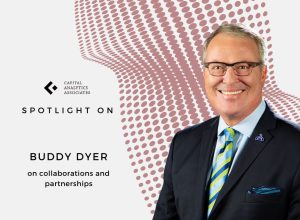 3 min read March 2024 — Orlando Mayor Buddy Dyer talked to Invest: about the city’s work toward promoting its business clusters. He noted how the city supports developing a technology cluster focused on gaming in downtown Orlando, aside from its more traditional clusters for theme parks. Dyer also discussed the city’s strategies to promote affordable housing and curb homelessness.
3 min read March 2024 — Orlando Mayor Buddy Dyer talked to Invest: about the city’s work toward promoting its business clusters. He noted how the city supports developing a technology cluster focused on gaming in downtown Orlando, aside from its more traditional clusters for theme parks. Dyer also discussed the city’s strategies to promote affordable housing and curb homelessness.
As Orlando’s longest-serving Mayor, what key achievements are you most proud of that have occurred in the city over the last one to two years?
Our greatest achievements are our collaborations and partnerships. The culture we have created has enabled us to achieve many successes and work with local governments, businesses, and nonprofits. These achievements have occurred thanks to the Orlando community’s ability to put egos and partisan and jurisdictional differences aside to work for the city’s good.
We have become a prominent city in sports. We were just ranked the No. 1 sporting event destination in the United States. We recently hosted the Olympic Marathon Trials, a great three-hour Orlando showcase on network TV. U.S. Track & Field organizers said they have never had a better host city.
How is the city of Orlando working to promote its different economic sectors?
Orlando is known worldwide for theme parks such as Disney World, Universal Studios, and SeaWorld, so the city has a diverse tourism community. Nevertheless, it also has clusters of high-tech. We have the largest modeling simulation and training cluster in the country. We have been working hard to educate the business community about all the other aspects of the city where we enjoy great success.
What are Orlando’s most critical challenges concerning the city’s growth?
Transportation and adequate housing are our two most significant challenges. We receive anywhere between 1,000 and 1,500 new residents to the Central Florida area every week, which presents the challenge to accommodate that growth and ensure the quality of life that residents enjoy and new residents expect. We need more housing stock. The lack of those stocks touches affordable housing and the upper-end sector of the housing scale. On one hand, homelessness has been exacerbated because of the lack of affordable housing. On the other hand, a house that cost $500,000 a few years ago now costs $800,000 to $1 million.
What strategies has the city put in place to curb the issue of homelessness?
Orlando has devoted a lot of money to face that issue within the confines of the city. One of the few benefits that came from the COVID-19 pandemic was the federal funding that the city received. We allocated $58 million to affordable housing and homelessness initiatives. Most of that money went into the service providers that support the homeless. For instance, we invested $6 million in the Christian Services Center to help it open its first services center. That center will provide homeless individuals with hygiene, showers, and clothes-washing services, match people with jobs, and offer them job training, such as interviewing. One of our partners there, First-Step Staffing, has helped around 50 people by matching them with the city of Orlando.
What are the long-term strategic opportunities that Orlando aims to capitalize on in the next few years?
We are doing well in promoting our different business industry clusters. Our theme park cluster has some of the best theme parks in the world. We also have the most robust cluster for modeling, simulation, and training in America at the Central Florida Research Park. All five military branches are involved in that cluster. On the medical side, we have a healthcare cluster based in Lake Nona that includes a medical city.
Moreover, Orlando’s Creative Village is a high-tech cluster downtown that will focus largely on the gaming industry. Once EA moved its East Coast headquarters into that area, it started working as the anchor for that cluster. We have both a Valencia College and a UCF campus in Creative Village. We envisioned that, to grow and become a true cluster, Creative Village needed academic support to create talent for the tech jobs that would be created.
What are your top priorities over the next four years, having won your sixth term and announcing it as your last in Orlando?
Among my top priorities over the next four years will be completing the renovation of Camping World Stadium. The Orange County Commission just voted to allocate tourist development tax funding to that end and to upgrade the Kia Center. We also need to complete the second phase of Creative Village.
On the transportation front, we need to continue with the SunRail project. The first 61 miles will be completed later this year, and the next step is to take it from Orlando International Airport and to International Drive. We need to connect those business centers with commuter rail. We might not complete that within the next four years, but we must break ground on those projects and continue working on transportation. I would like to see us get a penny sales tax passed that helps with the commuter aspect of that project. Moreover, we need to continue tackling the issues of affordable housing and homelessness.
For more information, please visit:
